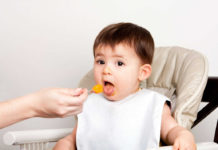 Normally baby cold symptoms can appear in almost all infants 5-6 times below 1 year of age.
Normally baby cold symptoms can appear in almost all infants 5-6 times below 1 year of age.
You can help your baby to ease the discomfort from cold symptoms and also keep the infection from worsening.
Make sure that your child gets sufficient rest and liquids, which would include breast milk or formula if she is less than four months old.
Babies between 4-6 months old can have little water and babies of age 6 months or greater can begin drinking juices.
Colds are respiratory tract infections caused by viruses. Most baby colds last a week or two, but some remain even longer.
Baby cold symptoms:
The most common baby cold symptoms are:
- Runny nose
- Watery eyes
- Coughing
- Low grade fever
- Sneezing
- Soar throat
- Difficulty in swallowing
- Swollen glands
- Becoming irritable
- Inflammation of eyes
Cold symptoms in babies of age three months or less are misleading and could lead to a serious disorder. You should immediately contact the pediatrician to lessen the baby cold symptoms.
If your child is more than three months old and is breathing by making loud noise then you should contact the doctor. Turning your baby’s nails and lips into blue shade is a very dangerous situation. You should contact the doctor to seek medical advice.
Care for your baby cold:
- There is no cure for the common cold but you can alleviate the miserable baby cold symptoms.
- Make sure that whether your baby is getting enough rest and plenty of fluids. Fluids can help loosen the congestion. Promote frequent feedings for younger babies.
- If your baby has nasal congestion, use rubber suction bulb to draw out the mucus from his nostrils. If the mucus is too thick then use saline nasal drops or saltwater nasal sprays to soften the mucus before extracting with the bulb.
- Massage with Vick’s menthol on your baby’s chest and a little bit on his nose. This makes breathing easier.
- Place a dehumidifier in your baby’s room. It helps to soothe irritated nasal passages. Remove moisture from your baby’s crib to keep the bedding from becoming damp. This helps your baby to get some relief.
- Use over-the-counter pain relievers. For babies less than 3 months old, use acetaminophen or ibuprofen to relieve discomfort or fever.
- Avoid cigarette smoking at your house.
- Place your baby to sleep at a slightly incline position. This helps to relieve postnasal drip.
Preventions for your baby cold:
- Keep your baby away from anyone who has cold.
- Wash your hands before feeding or caring for your baby.
- Clean your baby’s toys and pacifiers often.
- Keep your baby well hydrated.
- Give your baby a warm bath. Warm bath will help open up those stuffed up nostrils.















